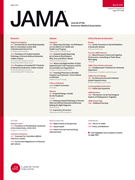 JAMA has issued an Expression of Concern about a 2005 study of whether two different types of vitamin B could prevent broken hips in people who’d suffered strokes.
JAMA has issued an Expression of Concern about a 2005 study of whether two different types of vitamin B could prevent broken hips in people who’d suffered strokes.
In this Japanese population with a high baseline fracture risk, combined treatment with folate and vitamin B12 is safe and effective in reducing the risk of a hip fracture in elderly patients following stroke.
Here’s the notice for the study, “Effect of folate and mecobalamin on hip fractures in patients with stroke: a randomized controlled trial:”
Several concerns have been raised about the study conduct, integrity, and scientific validity involving an article published in JAMA by Dr Sato et al.1 After communicating these concerns to the author and evaluating his response, we have contacted administrative officials at the author’s institution and requested that they conduct an investigation to evaluate the scientific integrity of the research and the validity of the reported study results. This notice of concern is to inform readers about these possible issues related to this article. After additional information from this investigation becomes available, we will determine whether additional action is warranted.
JAMA editor in chief Howard Bauchner gave Retraction Watch some details:
We received an allegation of possible data manipulation approximately 15-18 months ago. We conducted an internal assessment and thought that the concerns that were raised warranted contacting the author. We did receive a response from the author, but felt it was not sufficient to dismiss the allegations. We then contacted the author’ institution, and have requested a formal investigation.
The amount of time and effort invested in this case has been substantial. But as you well know data manipulation is a serious allegation and has to be investigated with great care.
The individual who raised the issues also raised issues about publications by this author in other journals. I have urged this individual on a number of occasions to also contact those journals, but to my knowledge, I have not been informed about whether this has occurred.
The paper has been cited 172 times, according to Thomson Scientific’s Web of Knowledge. It was the subject of a 2006 correction:
We apologize to the readers of JAMA for an incorrect statement that we made in our article1 on the effect of folate and mecobalamin on hip fractures in patients with stroke. We inaccurately stated that the study was performed in a single hospital (Futase Social Insurance Hospital). There were actually 3 additional collaborating hospitals, studying 205, 211, and 159 patients, respectively. The remaining 53 patients were from Futase Social Insurance Hospital, for a total of 628 patients.
We regret any confusion that may have arisen over this misleading statement.
JAMA‘s first-ever Expression of Concern — published in 2012 — also involved a study of hips.
We’ve contacted Sato, and will update with anything we learn.
Hat tip: Swapnil Hiremath
Like Retraction Watch? Consider supporting our growth. You can also follow us on Twitter, like us on Facebook, add us to your RSS reader, and sign up on our homepage for an email every time there’s a new post.
I have an expression of concern about JAMA: They should just retract such studies rather than let it live on as a part of the scientific record. I think the purity of science and benefit to the public are the cornerstone of JAMA’s mission, but they have turned it into a weak foundation. SHAME!
Ed, in full agreement, both with respect to the weakness of JAMA, and to the need to retract such studies with misleading statements. You cannot have fish and meat, it’s either fish, or meat.
Do we have any more details about what these concerns were?
Ivan, can you or Howard Bauchner answer a couple of questions?
1. Since JAMA has carried out a lengthy and extensive investigation already, why have they not informed and co-operated with the editors of the other affected journals and shared the results of their investigation? Why is the onus on the individual to contact those editors who presumably will then have to replicate JAMA’s investigation?
2. Are the concerns raised related to concerns published in a letter about other Sato trials (Halbekath, Arch Intern Med 2007;167:513-4)? If so, will an Expression of Concern about the 2 Archives papers follow shortly? Since Archives is in the JAMA family of journals for which Dr Bauchner is the editor-in-chief, presumably he has investigated the concerns about those papers as well.
3. What would it take for this paper to be retracted? The authors have already mislead people about where the study was carried out, which seems bizarre, worrying issues were raised in the Halbekath letter, and now there is this.